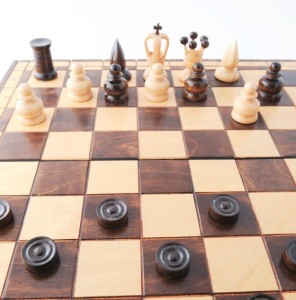I know this may sound presumptuous, but I have one of the best HR jobs ever !! It has definitely been the best of my career. One of the highlights is that I meet weekly with my boss who is part of the C-Suite. Now, don’t start to shudder thinking this is going to be another one of those “seat at the . . . ” posts.
 Our weekly meetings are great because we talk about HR, the organization as a whole, our families and many other items. He always has some nugget for me to chew on, and I appreciate that he does his best to develop me. Recently he asked me if I practiced HR playing checkers or chess. I wasn’t sure where he was going with this so I took the bait. I chose not to answer directly and returned with the question – “Which one should I be doing?”
Our weekly meetings are great because we talk about HR, the organization as a whole, our families and many other items. He always has some nugget for me to chew on, and I appreciate that he does his best to develop me. Recently he asked me if I practiced HR playing checkers or chess. I wasn’t sure where he was going with this so I took the bait. I chose not to answer directly and returned with the question – “Which one should I be doing?”
He explained which game made more sense for my role personally and for the organization. Can you guess which one? It’s Chess.
Many HR practitioners get caught up playing Checkers though. They move in straight lines and either forward or backward. They are more concerned with “getting things done” so they can reach the other side of the board and get rewarded. This is much more of a short-term task oriented approach. It may have bursts of success and things are coming off lists, but the pace never ends. It’s really a narrow way to practice what we do and can be very frustrating. If things occur that aren’t in a task format, you may halt and not move at all.
HR played like Chess is much different. This takes into account multiple players who have various skills. It also knows that the return move by the other team will not be predictable. There is strategy and various ways to conduct counter moves throughout the game. You can position yourself well and look ahead at what may happen. True, you may suffer losses and setbacks, but it doesn’t mean that you’ll be defeated. You can still get tasks done, but those can happen by every member of your team using their strengths !!
The other primary reason to approach HR as a Chess game is that you’re going to be playing with other departments who may have to play Checkers. How can you bring a long-term, strategic approach to those who are task oriented? I think the key is that you have be agile and adaptable in order to be strategic. I’m not talking about designing or developing some massive written publication. This is more hands-on and requires you to make the moves on the board – where they’re happening anyway !!
Which game do you play currently? Trust me when I say that you need to evaluate and determine which one it is. It’s difficult to try to keep either one of them as a hybrid because you will tend to drift toward what is more comfortable versus what is more challenging.
Chess takes time, thought and risks. We continue to think that if we pursue these characteristics in our job we aren’t “really working.” That just isn’t true !! Taking time to do HR well while being thoughtful in your approach is essential. Also, risk taking has to occur in order for you to move forward.
Making the switch to Chess is needed and fulfilling. Let me leave you with this . . .
Pawn to E4. Now it’s your move !!

Great food for thought.